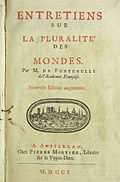- Conversations on the Plurality of Worlds
-
Conversations on the Plurality of Worlds (French: Entretiens sur la pluralité des mondes) is a popular science book by French author Bernard le Bovier de Fontenelle, published in 1686. It offered an explanation of the heliocentric model of the Universe, suggested by Nicolaus Copernicus in his 1543 work De revolutionibus orbium coelestium. The book is Fontenelle's most famous work and is considered to be one of the first major works of the Age of Enlightenment.
Contents
Background
Unlike many scientific works of its time, Conversations on the Plurality of Worlds was written not in Latin, but in French and is notable as one of the first books to attempt an explanation of scientific theories in popular language. In the preface, Fontenelle addresses female readers and suggests that the offered explanation should be easily understood even by those without scientific knowledge. This move has been praised by some of modern feminist critics as admitting women's intelligence in scientific matters.[1]
Plot summary
The book itself is presented as a series of conversations between a gallant philosopher and a marquise, who walk in the latter's garden at night and gaze at stars. The philosopher explains the heliocentric model and also muses on the possibility of extraterrestrial life. At the same time, Fontenelle avoided challenging the Catholic Church and its view of the world.
Translations
The first English translation was compounded by John Glanvill in 1687, followed by another translation by Aphra Behn in 1688, under the title A Discovery of New Worlds. Antiokh Kantemir translated it into Russian in 1730, although the translation was only published in a censored edition in 1740, due to objections from Russian Orthodox Church.
Reception
The book was very well received both in France and elsewhere, and was regularly published. In 1691, Fontenelle was elected to Académie française.[2]
References
- ^ Conversations on the Plurality of Worlds. By Bernard le Bovier de Fontenelle. Translated by H. A. Hargreaves. Edited by Nina Rattner Gelbart. Berkeley: University of California Press. 1990.
- ^ "Fontenelle, Bernard Le Bovier, sieur de." Encyclopædia Britannica. 2007. Encyclopædia Britannica Online. 3 March 2007 [1].
External links
- Full text of 1800 edition at Google Books (in French)
- Full text of 1803 edition at Google Books (in English)
- Full text of 1803 edition Digitized by Google, Free Download at OpenLibrary (in English)
Categories:- 1686 books
- French books
- Age of Enlightenment
- Popular science books
- Science book stubs
Wikimedia Foundation. 2010.

